1 Calving supplies
Preparation and organisation is the key to a successful calving season. Looking for ropes when the first feet of 2023 appear probably isn’t the best possible start. Make sure there is an ample supply of gloves, lube gel and iodine. Are all lights working in the calving pens and are there suitable gates to restrain a cow in the event of a C-section? Have calving pens been cleaned out and disinfected? Is there enough straw for the calving season?
2 BDGP/HerdPlus analysis
ICBF has a huge amount of information stored on suckler herds around the country. By joining HerdPlus you get access to calving reports, slaughter reports, BDGP reports, BEEP weighing reports, etc. If you’re not up to speed with navigating online, ask someone home for Christmas to take you through it and print them off.
If you’re into breeding and genetics, hours can be spent analysing reports and comparing a cow’s actual performance to the predicted performance. It always throws up some surprises and could be used to your advantage during next year’s breeding season. The latest is the myostatin test on breeding stock. Animals which have been genotyped as part of BDGP have this available and it’s an important result to take note off if you want to avoid double copies of hard calving genes.
3 Make a fertiliser plan
Fertiliser prices may be back a little, but are still very high relative to the margins. Given where the market is at the moment, I would be advising drystock farmers to stay out of the market for the full complement of fertiliser just yet. There is merit in having a few tonnes in the yard for spreading on some grazing ground and maybe some of the silage ground in 2023.
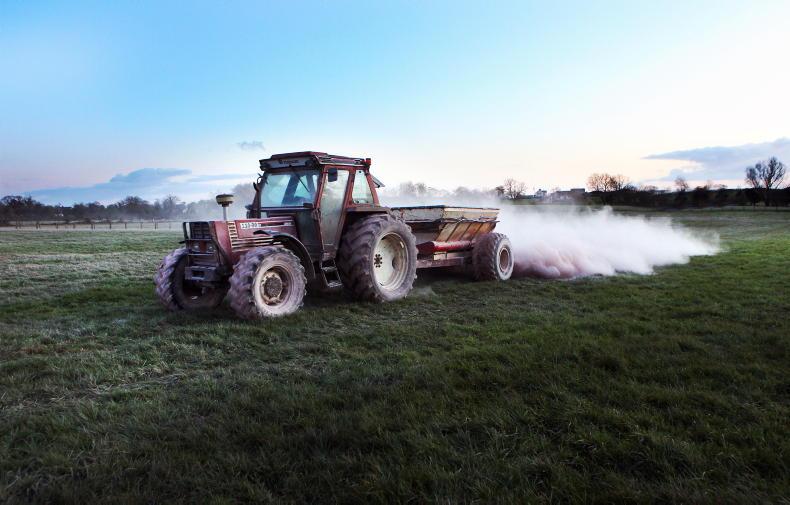
pH should be corrected through the application of lime early in 2023.
Soil sampling is a lot cheaper than buying fertiliser and correcting P and K indexes is very important in a time of high fertiliser prices. The pH of your soil should also be looked at to make sure that any fertiliser spread in 2023 is getting the maximum return on it. Lime is still relatively cheap in terms of the return it can give you, so plan a lime spreading programme for 2023 on your farm.
4 Dosing
If cattle are housed for eight weeks, the Christmas holiday period is often a good time to look at fluke dosing on farms. Once animals have been housed eight to 10 weeks or more, products that only kill mature fluke can be used.
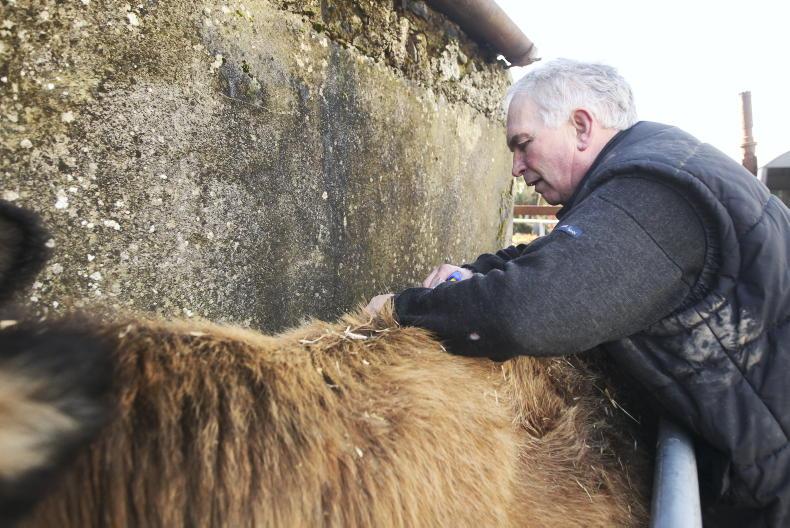
Make sure you talk to your vet about dosing animals for fluke worms and lice this winter.
Vets have been advising that due to mild and wet conditions this autumn, fluke has become an issue on some farms, so it’s important to address any issues as soon as possible. Where autumn-born calves have been outdoors for any period of time at all, they will most likely need a worm dose.
5 Clip cattle, treat for lice
With animals housed a few weeks, lice issues can start to accelerate at this time. With mild weather over the past few weeks, sheds have provided ideal conditions for lice to take hold.
Clipping animals can help reduce heat stress in sheds and can also help to keep cattle cleaner when tails are clipped. Pour-ons are easy to use, but be careful to use gloves and measure correct amounts when applying.
6 Weigh your weanlings
If a weighing scales is available on the farm, mid-winter is a good time to assess the performance of your weanlings. Weanlings should be gaining between 0.6kg-0.8kg/day and poor weight gains could point to health issues in animals or insufficient supplementation. Is silage quality up to scratch?
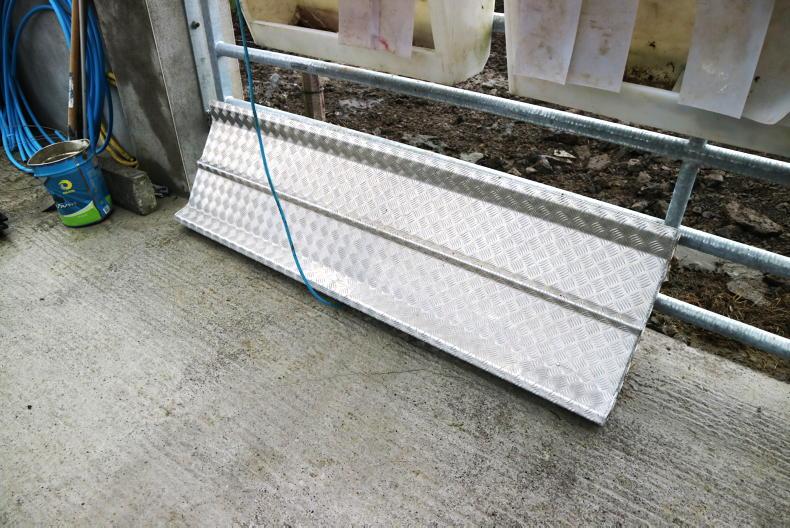
Weighing weanlings to assess performance is very important to make sure they hit daily liveweight gain targets.
Poor thrive could also be due to underlying pneumonia issues due to poor ventilation. Take a look at lying space, feeding barriers and drinkers in the shed to make sure there is nothing limiting intakes. Make adjustments and if animals are behind target, try and target these for early turnout if possible.
7 Review health and safety plan
Take a look around the yard to see if there are any health and safety issues. Be mindful of young visitors in the yard at Christmas time who are unfamiliar with the dangers of the farm. Make a list of items that need attention and use the free time over Christmas to attend to the little jobs that never get done. Can water be diverted to prevent the yard freezing over and causing a slip or fall? Is all health and safety signage in place around the farm?
8 Complete a fodder budget
Christmas is a good point to take action if you think silage stocks are going to run low. Measure your pit or count the remaining bales to see what fodder is left. Feeding straw to spring-calving suckler cows could help alleviate some of the problem.
There appears to be lots of silage around, but depending on the spring we get, this could go up in price, so plan early to avoid having to panic in 2023. Plan for early turnout if silage stocks are very low.
9 Take a break
I’ve listed enough jobs for a month above, but Christmas can be a quiet time on many farms. In general, calving doesn’t start on most farms until next month at the earliest. Take time to rest and recuperate over the holiday period and spend time with family when they are around.
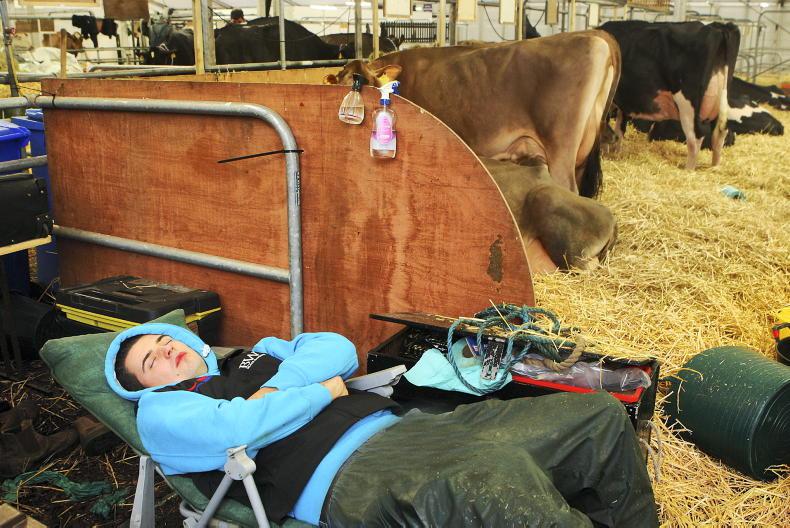
Taking a break is also important to recharge the batteries ahead of the busy spring period on farms.
Sometimes, farmers are running so hard that they don’t see the issues on the farm that need attention. Take time to reflect on the operation and where improvements can be made. Take some time away this Christmas and talk to people in different walks of life to broaden perspectives.
10 Succession plan
In many houses, this is often a no-go area and a sensitive and awkward subject to talk about. Maybe not a conversation starter for after the dinner on Christmas day, but Christmas can sometimes be a good time to talk about this subject with all family members home for the Christmas break.
Arrange everybody for a discussion around the table and meet the issue head on by having a structured discussion. Putting it off or expecting things to sort themselves out won’t help. Involve everybody and have it discussed with your partner beforehand. This can be a massive weight off someone’s shoulders when sorted.
1 Calving supplies
Preparation and organisation is the key to a successful calving season. Looking for ropes when the first feet of 2023 appear probably isn’t the best possible start. Make sure there is an ample supply of gloves, lube gel and iodine. Are all lights working in the calving pens and are there suitable gates to restrain a cow in the event of a C-section? Have calving pens been cleaned out and disinfected? Is there enough straw for the calving season?
2 BDGP/HerdPlus analysis
ICBF has a huge amount of information stored on suckler herds around the country. By joining HerdPlus you get access to calving reports, slaughter reports, BDGP reports, BEEP weighing reports, etc. If you’re not up to speed with navigating online, ask someone home for Christmas to take you through it and print them off.
If you’re into breeding and genetics, hours can be spent analysing reports and comparing a cow’s actual performance to the predicted performance. It always throws up some surprises and could be used to your advantage during next year’s breeding season. The latest is the myostatin test on breeding stock. Animals which have been genotyped as part of BDGP have this available and it’s an important result to take note off if you want to avoid double copies of hard calving genes.
3 Make a fertiliser plan
Fertiliser prices may be back a little, but are still very high relative to the margins. Given where the market is at the moment, I would be advising drystock farmers to stay out of the market for the full complement of fertiliser just yet. There is merit in having a few tonnes in the yard for spreading on some grazing ground and maybe some of the silage ground in 2023.

pH should be corrected through the application of lime early in 2023.
Soil sampling is a lot cheaper than buying fertiliser and correcting P and K indexes is very important in a time of high fertiliser prices. The pH of your soil should also be looked at to make sure that any fertiliser spread in 2023 is getting the maximum return on it. Lime is still relatively cheap in terms of the return it can give you, so plan a lime spreading programme for 2023 on your farm.
4 Dosing
If cattle are housed for eight weeks, the Christmas holiday period is often a good time to look at fluke dosing on farms. Once animals have been housed eight to 10 weeks or more, products that only kill mature fluke can be used.

Make sure you talk to your vet about dosing animals for fluke worms and lice this winter.
Vets have been advising that due to mild and wet conditions this autumn, fluke has become an issue on some farms, so it’s important to address any issues as soon as possible. Where autumn-born calves have been outdoors for any period of time at all, they will most likely need a worm dose.
5 Clip cattle, treat for lice
With animals housed a few weeks, lice issues can start to accelerate at this time. With mild weather over the past few weeks, sheds have provided ideal conditions for lice to take hold.
Clipping animals can help reduce heat stress in sheds and can also help to keep cattle cleaner when tails are clipped. Pour-ons are easy to use, but be careful to use gloves and measure correct amounts when applying.
6 Weigh your weanlings
If a weighing scales is available on the farm, mid-winter is a good time to assess the performance of your weanlings. Weanlings should be gaining between 0.6kg-0.8kg/day and poor weight gains could point to health issues in animals or insufficient supplementation. Is silage quality up to scratch?

Weighing weanlings to assess performance is very important to make sure they hit daily liveweight gain targets.
Poor thrive could also be due to underlying pneumonia issues due to poor ventilation. Take a look at lying space, feeding barriers and drinkers in the shed to make sure there is nothing limiting intakes. Make adjustments and if animals are behind target, try and target these for early turnout if possible.
7 Review health and safety plan
Take a look around the yard to see if there are any health and safety issues. Be mindful of young visitors in the yard at Christmas time who are unfamiliar with the dangers of the farm. Make a list of items that need attention and use the free time over Christmas to attend to the little jobs that never get done. Can water be diverted to prevent the yard freezing over and causing a slip or fall? Is all health and safety signage in place around the farm?
8 Complete a fodder budget
Christmas is a good point to take action if you think silage stocks are going to run low. Measure your pit or count the remaining bales to see what fodder is left. Feeding straw to spring-calving suckler cows could help alleviate some of the problem.
There appears to be lots of silage around, but depending on the spring we get, this could go up in price, so plan early to avoid having to panic in 2023. Plan for early turnout if silage stocks are very low.
9 Take a break
I’ve listed enough jobs for a month above, but Christmas can be a quiet time on many farms. In general, calving doesn’t start on most farms until next month at the earliest. Take time to rest and recuperate over the holiday period and spend time with family when they are around.

Taking a break is also important to recharge the batteries ahead of the busy spring period on farms.
Sometimes, farmers are running so hard that they don’t see the issues on the farm that need attention. Take time to reflect on the operation and where improvements can be made. Take some time away this Christmas and talk to people in different walks of life to broaden perspectives.
10 Succession plan
In many houses, this is often a no-go area and a sensitive and awkward subject to talk about. Maybe not a conversation starter for after the dinner on Christmas day, but Christmas can sometimes be a good time to talk about this subject with all family members home for the Christmas break.
Arrange everybody for a discussion around the table and meet the issue head on by having a structured discussion. Putting it off or expecting things to sort themselves out won’t help. Involve everybody and have it discussed with your partner beforehand. This can be a massive weight off someone’s shoulders when sorted.









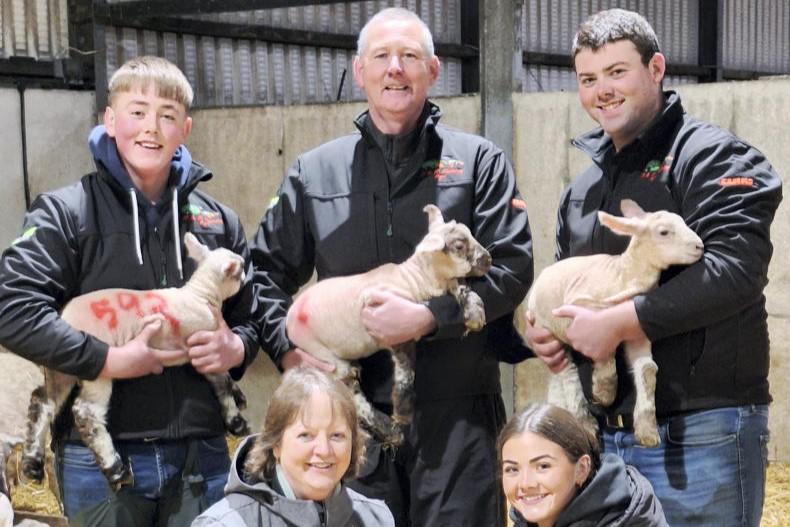

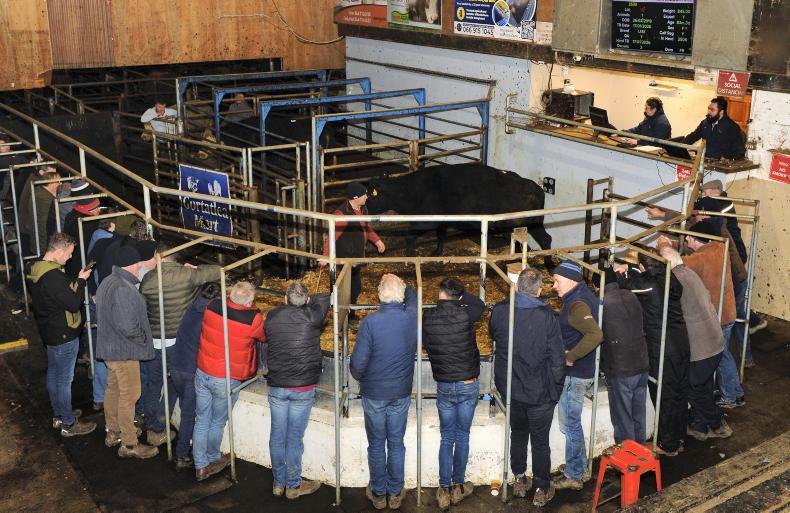
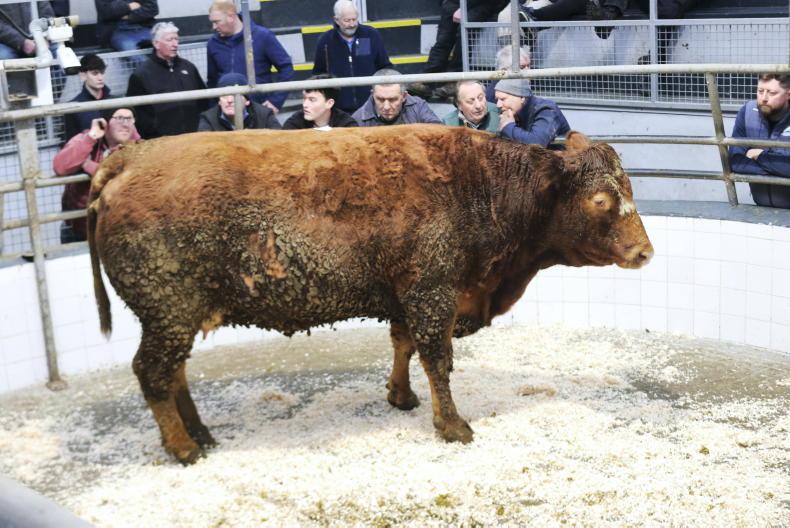
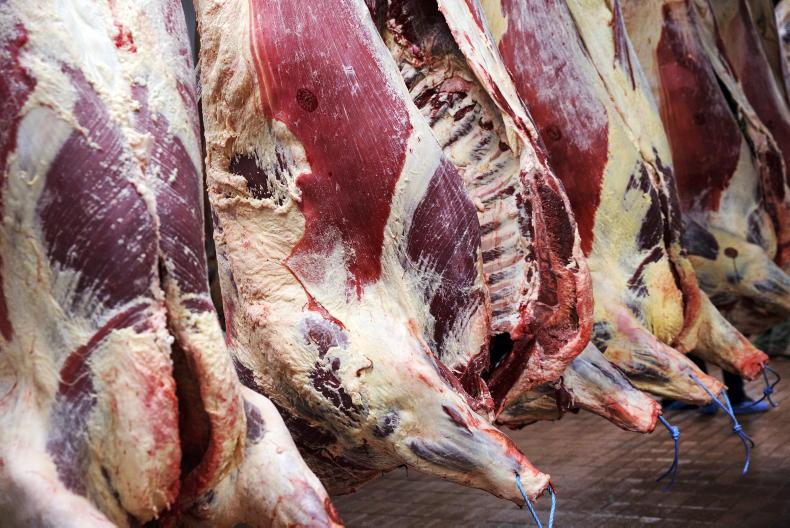
SHARING OPTIONS